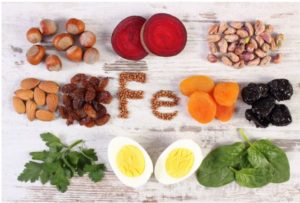Feeling Exhausted and Rundown?
If you find yourself constantly feeling exhausted you may not be getting enough iron for your needs. Iron is an essential mineral that has a number of jobs in the body, including making healthy red blood cells. These deliver oxygen to all of your other cells where it is used to create energy – so it’s not surprising that you can feel extremely fatigued if you are not getting enough iron, or not absorbing it properly.
Low iron does not only lead to fatigue though – several other symptoms can reveal something is not quite right.
Iron Famine
Do you experience any of the following? These are all tell-tale signs you may need an iron assessment:
- Dizziness;
- Allergies;
- Frequent colds or flu;
- Headaches;
- Paleness on the inside of lower eyelids;
- Restless legs; and/or
- Dry and damaged hair or skin.
Or perhaps you fall into one of the following groups of people more at risk of developing low iron levels. This can be due to increased need for iron, dietary choices, or an ageing stomach affecting digestion:
- Pregnant or menstruating women;
- Teenagers;
- Vegetarians and vegans;
- Athletes; and/or
- The elderly.
What’s Your Number?
Knowing your iron levels before simply taking an iron tablet is essential, because too much iron can be harmful. Also, some symptoms of low iron may be due to other causes, so professional assessment is important. I can request the most appropriate iron tests for your situation and advise if you need to adjust your diet or take some temporary supplementation to raise your iron levels to normal again.
Popeye’s Favourite’s
Your diet should always be the first place you obtain iron. Animal sources of iron (also known as haem iron) include beef, chicken, fish, lamb, sardines, and turkey. Nevertheless, ensure you also incorporate plenty of vegetarian iron-rich (non-haem iron) foods, such as dark leafy greens (spinach, kale), chia seeds, eggs, lentils, and molasses.
However, even if your diet contains many of these foods, if you experience any digestive discomfort, such as bloating, constipation or diarrhoea, then gut function may be affecting your ability to absorb all of your nutrients, including iron. If this is you, it’s time to heal your digestive system to optimise your health and energy. A happy tummy means a happy you!
Joining the Iron Party
When it comes to energy, iron loves company, so having a few key nutrient friends around helps it to function best. Some of these include:
- Vitamin C: This vitamin helps your body absorb and use iron. It also helps make healthy red blood cells, which transport oxygen to your cells. Vitamin C rich foods include citrus fruits, kiwi fruit, red capsicums, papaya, broccoli and kale.
- B vitamins: Three key B vitamins are also involved in red blood cell production, namely B6, B12 and folate. The foods high in iron listed above are also high in B vitamins; another reason to include them in your diet.
- Vitamin D: Adequate levels of the sunshine vitamin are needed to absorb iron, and not enough iron can lead to low vitamin D levels, therefore you need to have good levels of both. Your Natural Healthcare Practitioner will also recommend you check your vitamin D levels if this is required.
If you do need to take iron, it’s important to know there are different ‘forms’ available, some of which cannot be absorbed very well, leading to undesirable symptoms of nausea and constipation. Look for Meta Fe® – iron bisglycinate as this both highly absorbed and well-tolerated, allowing you to feel better, quicker.
All’s Well That Ends Well
If you suspect you may have low iron, need help optimising your diet, or improving your digestion – don’t put up with feeling less than vibrant. Click below to talk to me about checking your iron levels today, you’ll be feeling more energetic and vital in no time!
